Odesa Pride attacked by Ukrainian nationalist group ‘Tradition and Order’
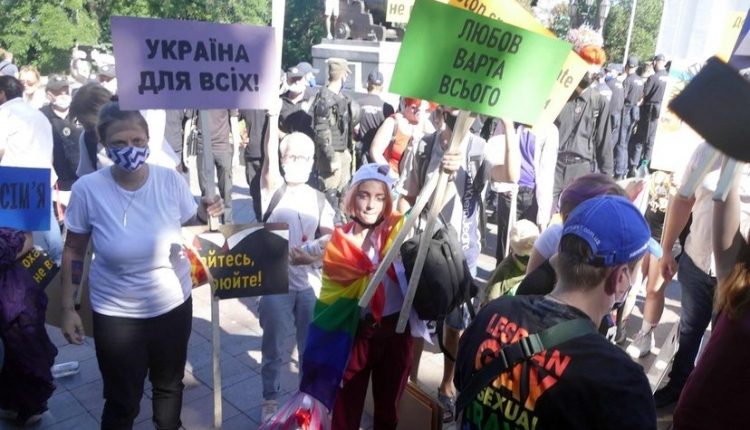
On the 30th of August, Odesa Pride tried to hold a peaceful gathering on one of the central streets of Odesa, Ukraine. Despite the fact that the group Tradition and Order were issuing threats before the event and came prepared to the gathering, where they acted violently, the authorities failed to prevent the attacks and ensure the freedom of assembly of the Odesa Pride participants.
The municipal and police authorities had been informed of the event well in advance and they had been specifically requested to protect the members of Odesa Pride against foreseeable protests by nationalist group. The nationalist group Tradition and Order issued several threats against the event and declared a counter demonstration. Ukrainian local authorities thus knew the risks surrounding the event, and they had been asked to provide heightened protection to participants of Odesa Pride. However, only a limited number of police officers were initially deployed and they allowed the aggression of Tradition and Order to develop into physical violence against participants of the Pride. Several participants were pepper-sprayed and attacked with corrosive substances: one person received 1st degree burns, another person received severe head injuries.
Ukraine, as a signatory of international and regional human rights treaties, member of the Council of Europe and under the Partnership and Cooperation Agreement with the European Union and under own Constitution, has an obligation to protect participants of peaceful demonstrations and prevent any attempts to unlawfully disrupt or inhibit the effective enjoyment of right to freedom of expression and peaceful assembly of all people, including LGBTI people.
Given the fact that hate crimes against LGBTI people are investigated ineffectively, offenders often avoid responsibility or charged with petty crimes and motives of intolerance on grounds of sexual orientation, gender identity, gender expression and sex characteristics are often ignored in Ukraine, ILGA-Europe are concerned that the Ukrainian authorities will fail to conduct a proper investigation of Odesa Pride attacks and inadequate response of the police to the event as they failed to investigate attacks of Pride events and failure of police to protect the events in previous years.
ILGA-Europe calls on the European Union and Council of Europe to hold the Ukrainian authorities accountable to the human rights obligations they have committed to as part of the EU-Ukraine Association Agreement and member of the Council of Europe.
ILGA-Europe calls on the EU and Council of Europe to:
- Remind Ukraine of its obligations and duties under domestic law and international human rights law to respect, guarantee, protect and fulfil fundamental rights without discrimination
- Urge Ukraine to conduct a proper investigation of allegations of victims of attacks during the Odesa Pride and launch a comprehensive and meaningful inquiry into the circumstances and bring all perpetrators of hate crimes to justice and ensure effective remedy for victims, including compensation.
- Ensure non-repetition of such incidents and urge the respective authorities to provide well-trained, efficient and sufficient police protection to human rights defenders and Pride attendees, so as to ensure that their respect to peaceful assembly can be effectively enjoyed
- Urge Ukraine to adopt legislation on hate crimes that is motivated by sexual orientation, gender identity, gender expression and sex characteristics or other minority status;
Background information
Preparation
In August, Odesa Pride organisers – Gay Alliance Odesa – held several preparatory meetings with the police to consult them on safety of the event. During these consultations, the police was provided with a final list of all events to be held during the Odesa Pride: format, location, time, and degree of openness. Police suggested live chain format to ensure safety of members of the event and suggested location for the event. Pride organisers agreed to all suggestions of the police.
On August 20, after consultation with the police, the EUAM and a representative of the Ombudsman Institute, organiser sent official notification to the City Hall and the police that Odesa Pride will held on August 29, 2020. At the same day, police contacted organisers and suggested to reschedule the event on August 30 and this proposal was supported by the Gay Alliance Odesa.
On August 25, organisers met with contact persons from the Dialogue Police, the Department of Preventive Work and Street Activities, as well as representatives of the EUAM at the chose location for the Odesa Pride. At the meeting, organisers informed police about threats by nationalist group – Tradition and Order. Police informed organisers that they are aware of threats and monitoring the situation.
On August 28, organisers held final consultation with police. Threats, provocations, possible disruptions and strategies of counter actions were discussed during the meeting. Police informed organisers that they are still monitoring the situation and contacted counter demonstrators and received assurance from organisers of the counter demonstration that no attacks are planned.
Odesa Pride and attacks
In the morning of August 30, around 11.00 a.m., prior to the start of the Odesa Pride, organisers called police to confirm location and safety of the situation. Upon arrival, around 14.00, Odesa Pride organisers found out that agreed location was occupied by counter demonstrators – Traditional and Order. Police had made no attempts to vacate the agreed location for the event. Police insisted on relocation of the Odesa Pride as agreed location was occupied by Tradition and Order.
At 14:40, after negotiations between police and organisers of the Odesa Pride, Odesa Pride was relocated to Dumskaya Square to ensure safety of all participants of the Pride event. After 15 minutes, counter demonstrators followed the Pride participants to Dumskaya Square. Police did not make any attempts to draw live chain between the parties despite aggression and threats of counter demonstrators.
After 10 minutes of counter demonstrators’ arrival, they started attacking participants of the Odesa Pride and police failed to react to these attacks: no arrests were made. After first wave of attacks, police surrounded participants of the Odesa Pride to shield them from attacks but some participants were left outside of the circle and continued being under attack of counter demonstrators.
In next 10 minutes, Tradition and Order members attacked the police. Police began to react to the surrounding events and clashes broke out between Tradition and Order and police, during which one police officer was seriously injured. Police started arresting some members of Tradition and Order.
During next 1.5 hour, a group of about 30 activists surrounded by police were continuously attacked by counter demonstrators: pepper spray, blows with sticks, bottles and other objects (paint, eggs, stones, sticks, water bottles) had been thrown at them by members of Tradition and Order. These attacks were accompanied by insults and threats of violence and murder.
After 1.5 hours, participants of the Odesa Pride were securely removed from the Dumskaya Square by the police.
Poland: International institutions must protect LGBTI citizens and ensure the immediate release of activists
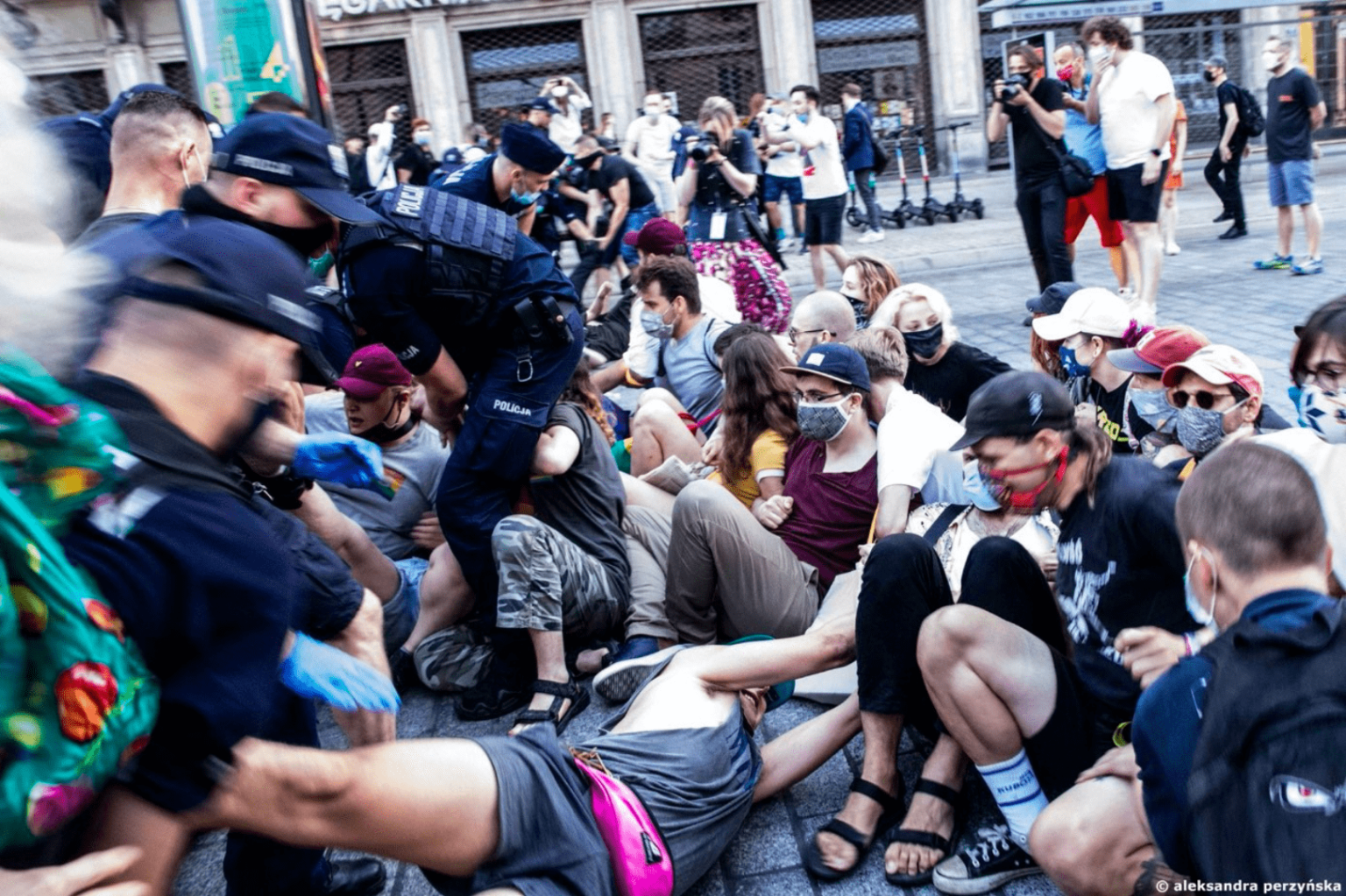
After nearly 2 years of mounting pressure, things came to a boiling point yesterday, August 7, in Warsaw. A spontaneous protest related to the “preventative detention” of an LGBTI activist, Margot Szutowicz, resulted in 48 arrests and extensive police brutality last night. More protests, and more arrests, are expected today as the repression of LGBTI people goes unabated.
The hate campaign against the LGBTI community in Poland has been going on since October 2018 and resulted in LGBTI people becoming a dominant issue during this year’s presidential elections, in which President Duda degraded and scapegoated the LGBTI community on his way to election victory. This included claims that LGBT “are not people, but ideology” and other attempts at dehumanisation and incitement of hate and fear. Over 100 local governments adopted resolutions calling their territories “LGBT-free zones”. Trucks with homophobic banners and audio claiming a link between homosexuality and pedophilia begun driving in public spaces, in some cases stopped and blocked by LGBT activists and allied citizens outraged by the sharing of hateful messages. In one case an altercation ensued and one of the vehicles was damaged. This was followed by repeated covert arrests of LGBT activists by plain clothes police officers in unmarked cars, which creates a climate of fear and state harassment.
Just a few days ago, an action of decorating monuments with rainbow flags and face masks was organised, which was followed by another series of covert arrests. One of the persons arrested, Margot Szutowicz, received an order for a 2 month detention to prevent her from further action. This sparked a spontaneous solidarity demonstration, during which Margot attempted to surrender to the police officers present. Their refusal to detain her among witnesses and media, and the fact she was later detained in a different location by plainclothes officer in an unmarked car, led to further civil unrest. 48 individuals were arrested and refused access to lawyers. Margot, who is non-binary and uses female pronouns, will be detained in a men’s facility.
Björn van Roozendaal, Programmes Director at ILGA-Europe, says: “The LGBTI community is being denied the right to exist by the leading political party. LGBTI people in Poland live in a situation of constant, repressive pressure with no access to justice or State protection. In circumstances like these, where marginalised members of society are being attacked from all sides, protest and activism are inevitable, and may even be considered provoked by the government’s failure to protect their fundamental rights and disproportionate law enforcement responses. Let us not forget this is happening in an EU country where the human rights of all citizens are deeply rooted in law.”
We are calling international human rights institutions, including the European Union, the Council of Europe, and the United Nations, to raise their voices against police violence and arbitrary detention, and to demand that the rule of law be followed and fundamental rights protected for LGBTI people in Poland.
Campaign Against Homophobia (Kampania Przeciw Homofobii), an ILGA-Europe member organisation from Poland, is calling upon the state and international authorities to summon the District Prosecutor’s Office in Warsaw to revoke Margot’s pre-trial arrest warrant:
- District Prosecutor’s Office in Warsaw, sekretariat@warszawa.po.gov.pl, phone number: +48 22 217 31 20
- Zbigniew Ziobro, the Public Prosecutor General, zbigniew.ziobro@sejm.pl, phone number: +48 22 12 51 594
And upon the Polish police to immediately release those detained during yesterday’s demonstrations:
- Police Commander in Chief – gen. insp. Jaros?aw Szymczyk, kancelaria.gsp@policja.gov.pl, +48 22 25 00 112
- Minister of Internal Affairs and Administration Mariusz Kami?ski, mariusz.kaminski@sejm.pl,
+48 22 60 14 295
Updates (last updated on August 28):
- August 8-9: The ombudsperson visited all detainees.
- August 13: Margot Szutowicz had access to a lawyer.
- August 15: Police intervene when LGBTI activists try to stop a van with homophobic slogans from driving around Warsaw. Police forcefully remove activists and create a corridor of protection for the van with their bodies.
- August 16: Anti-LGBT march in Warsaw received police protection. LGBTI activists painted their route in rainbow colours, and held a counter-demonstration.
- August 28: Margot Szutowicz released from pre-trial detention
Further information:
- ILGA-Europe prepared a summary of Poland Anti-LGBTI Hate Timeline 2018-2020.
- ILGA-Europe prepared a info leaflet on how twin towns can help advocate against the discriminatory Family Charters.
- Check out our social media here, and here.
For further comment, contact:
- Ana Muñoz Padrós, Communication and Media Officer, ILGA-Europe at ana@ilga-europe.org or +32 2 609 56 59.
- Miroslawa Makuchowska, Deputy Director at Campaign Against Homophobia, Poland:
Turkey: Charges against 19 LGBTI+ rights defenders must be dropped
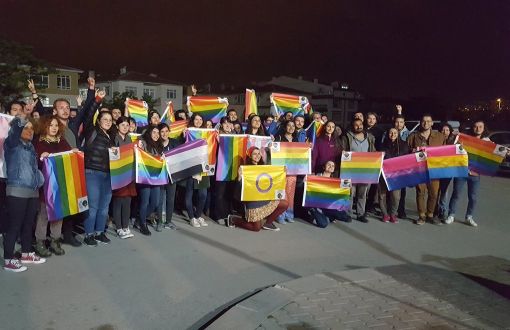
Civil Rights Defenders, International Federation for Human Rights (FIDH), Front Line Defenders and International Lesbian, Gay, Bisexual, Trans and Intersex Association (ILGA-Europe) call upon Turkish authorities to drop all charges against 19 LGBTI+ rights defenders due to stand trial on 12 November 2019 in Ankara
On 12 November 2019, 19 LGBTI+ rights defenders will stand trial, charged with “participating in an unlawful assembly” and “resisting despite warning” for attending the peaceful LGBTI+ Pride March at the Middle East Technical University (METU) campus in Ankara on 10 May 2019.
The 19 (18 students and one faculty member), were among 22 people who were arrested during the Pride March in METU, after police forces entered the university campus at the request of the university administration. Police dispersed the crowd using pepper spray, tear gas and plastic bullets. All 22 arrested were released later that day.
Speaking on behalf of the four organisations, Björn van Roozendaal, Programmes Director for ILGA-Europe said, “The defenders were practising their right to assembly and standing up for the rights of others in a peaceful manner when the police attacked and arrested them. No one should be prosecuted for exercising their right to peaceful assembly. All charges against the human rights defenders should be dropped immediately, and this case should be closed.”
The Pride March was organised by METU LGBTI+ Solidarity, a student group established in 1996, which works to secure gender equality, eradicate on-campus LGBTI+ phobia, and ensure that the university is a safe space for LGBTI+ people. The group has been organising Pride Marches on the campus every May since 2011.
On 6 May 2019, shortly before the METU Pride March, the university Rector, Mustafa Ver?an Kök, sent an email to all students, graduates, and faculty members, informing them that the Rectorate was prohibiting the event. He referred to the ban on LGBTI+ events in Ankara, issued by the Ankara Governor’s office on 3 October 2018 and warned that the Rectorate would ask the Ankara Police to intervene if the event took place. When the Pride March commenced, the police violently dispersed students.
Twenty-one students and one professor were taken into police custody. Shortly afterwards, the university opened administrative investigations against the students who participated in the Pride March. On 5 August 2019, 19 of the 22 arrested LGBTI+ rights defenders were notified that a criminal case had been opened against them, related to the charges of “participating in an unlawful assembly” and “resisting despite warning” under Article 2911 of Turkish Penal Court.
In November 2017, using the state of emergency powers, a blanket indefinite ban on public events focused on LGBTI+ rights was issued in Ankara. Despite the ending of emergency rule in July 2018, the Ankara Governor’s office did not lift the ban. On the contrary, on 3 October 2018, the Governor’s office informed law enforcement and other relevant authorities of a new ban, without giving any indication of when it would end.
On 19 April 2019, the Ankara Administrative Appeals Court lifted the ban introduced under the state of emergency, on the grounds that it was unlawful and restricted rights and freedoms in unconditional, vague, and disproportionate ways.
The four organisations said “We would like to remind the authorities that the state’s duty is to take security measures to protect peaceful assemblies and events, not ban them. The government should carry out a thorough and impartial investigation into the excessive use of force during the event, instead of prosecuting the human rights defenders. We reiterate our call to the authorities to drop all charges against the 19 defenders and ensure that all human rights defenders in Turkey are able to carry out their legitimate human rights activities without fear of reprisals and free of all restrictions.”
Istanbul Pride march must go ahead unhindered
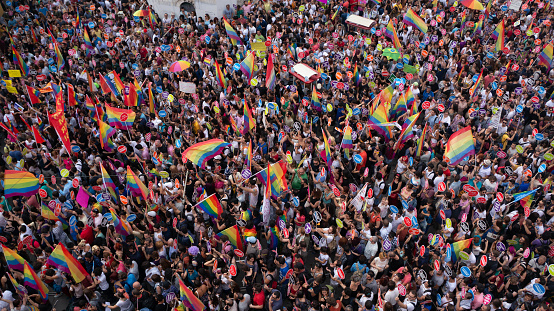
Joint public statement from Amnesty International, ILGA-Europe and All Out calling on authorities to ensure istanbul Pride takes place
As the annual Istanbul Pride due to take place on Sunday 1 July approaches, Amnesty International, ILGA-Europe and All Out stand in solidarity with Turkey’s LGBTI+ communities and their allies, calling on the authorities to ensure Istanbul Pride march takes place without any unlawful restrictions.
Björn van Roozendaal, Programmes Director for ILGA-Europe said:
“In 2018, Pride is undoubtedly a litmus test for democratic values – a test that over the past few years, Turkey has failed to meet. It’s particularly disappointing when you consider the incredible history of Pride in Istanbul. Sadly, the restrictions on LGBTI public events since then in the region are indicative of the attempted erosion of civil society organising and human rights. History is repeating itself.
And make no mistake, this is harming all of society, not just the LGBTI communities and their allies. Attacks on activism and dissenting voices, a constant refusal from authorities to engage with their citizens, and persistent disregard for fundamental rights – this is something that should provoke a reaction from all communities, not only the LGBTI movement.
Ankara ban on LGBTI events continues as Turkish courts reject NGO appeals
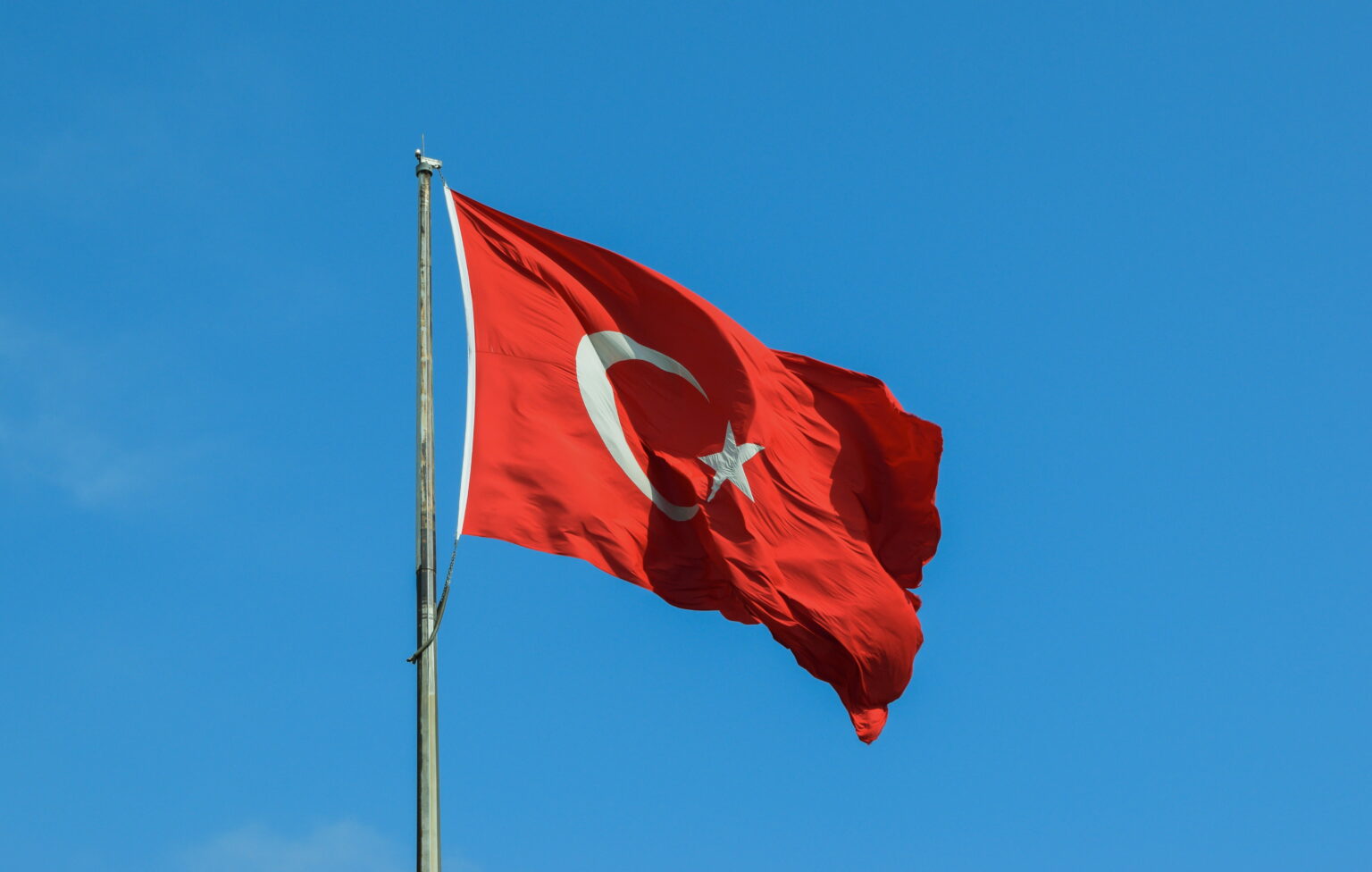
The ban on public events organised by LGBTI groups, imposed by the Turkish state of Ankara’s Governor in November 2017, has been upheld by Ankara’s 4th and 13th Administrative Courts.
Two Ankara-based LGBTI NGOs Kaos GL and Pembe Hayat (Pink Life) had challenged the ban in court, initiating their legal action days after Ankara’s governorship made the announcement. Both NGOs called the ban illegal and asked for the decision to be revoked.
However, both NGOs’ appeals to halt the Ankara ban have been rejected by the city’s administrative courts.
“The decisions are ridiculous, to be perfectly honest. The blanket ban is indiscriminate, vague, open-ended and a clear breach of fundamental human rights conventions that Turkey has willingly signed up to. It should never have been introduced in the first place, never mind defended.” commented Bjorn van Roozendaal, ILGA-Europe Programmes Director.
News of the court decision in relation to the ban in Ankara is even more concerning in light of the detention (and in some cases, re-arrests) of human rights activists in Turkey earlier this month. This included Kaos GL founder Ali Erol and provides yet another example of the deteriorating situation for civil society in the country.
The prohibition of any activities organised by LGBTI organisations in Ankara has had worrying consequences.
Firstly, the geographical impact of the ban did not stop at the capital city’s borders. Since it was introduced, Turkish LGBTI activists have reported that a Queer Festival was banned by the Beyo?lu District Governorship, that an LGBTI film screening in Bursa was disrupted by the police, and that the university administration at Middle East Technical University prevented two LGBTI-themed film screenings.
Activists have also noted that the Ankara ban coincided with a rise in anti-LGBTI hate speech, with negative comments appearing in the media (traditional and online platforms). This includes remarks specifically directed at LGBTI NGOs.
“Legitimising hate of LGBTI people through a measure like this is unacceptable. The message must go out that this is not OK, the Turkish LGBTI community is not alone and that your friends in other countries across Europe continue to support you in your legal fight.” concluded van Roozendaal.
#LGBTIYasaklanamaz #LGBTICantBeBanned
- Turkey currently sits at 46th in the Rainbow Europe ranking on law and policy.
- Kaos GL’s official media statement, reacting to the recent court decision rejecting the appeal, is available here.
- The Governor’s Office statement announcing the original ban is available here: (Turkish) (English translation)
Ban on LGBTI events in Ankara must be overturned

The ban on events organised by LGBTI organisations, as announced by the Ankara Governor’s Office last weekend (18-19 November 2017), is disturbing and a clear breach of fundamental freedoms and human rights.
The fact that events organised by LGBTI organisations are being targeted in this way is very unnerving. The public events they are organising are a vital outlet for LGBTI people living in the city. The LGBTI community are an integral part of society in Ankara and deserve to be protected by the local authorities.
The official statement cited public security, public order, public health and morality concerns as reasons to ban activities being organised by LGBTI groups.
The governor’s office stated that events such as film screenings, plays and exhibitions on LGBTI issues could cause “reactions and provocations against the groups and individuals taking part in the organization due to certain social sensibilities”.
These LGBTI events should be protected against any potential security threats, not dismissed in such a way. Several LGBTI organisations in Turkey have already called the ban unconstitutional and illegal and the Council of Europe’s Commissioner for Human Rights said today that “such a blanket ban clearly disregards Turkey’s international human rights obligations, notably under the European Convention on Human Rights”.
The ban also appears to be open-ended, with no clear end date being specified in the official statement from the governor’s office. This indefinite time period is yet another example of how civil society in Turkey is being prevented from functioning effectively.
ILGA-Europe are calling on the authorities in Ankara to rescind this disgraceful ban, and instead devote their energy to protecting the right to freedom of assembly and association of civil society groups.
- Turkey currently sits at 46th place in the Rainbow Europe ranking on law and policy.
- The Governor’s Office statement announcing the ban is available here.
- The announcement has been translated to English here.
Pride Watch
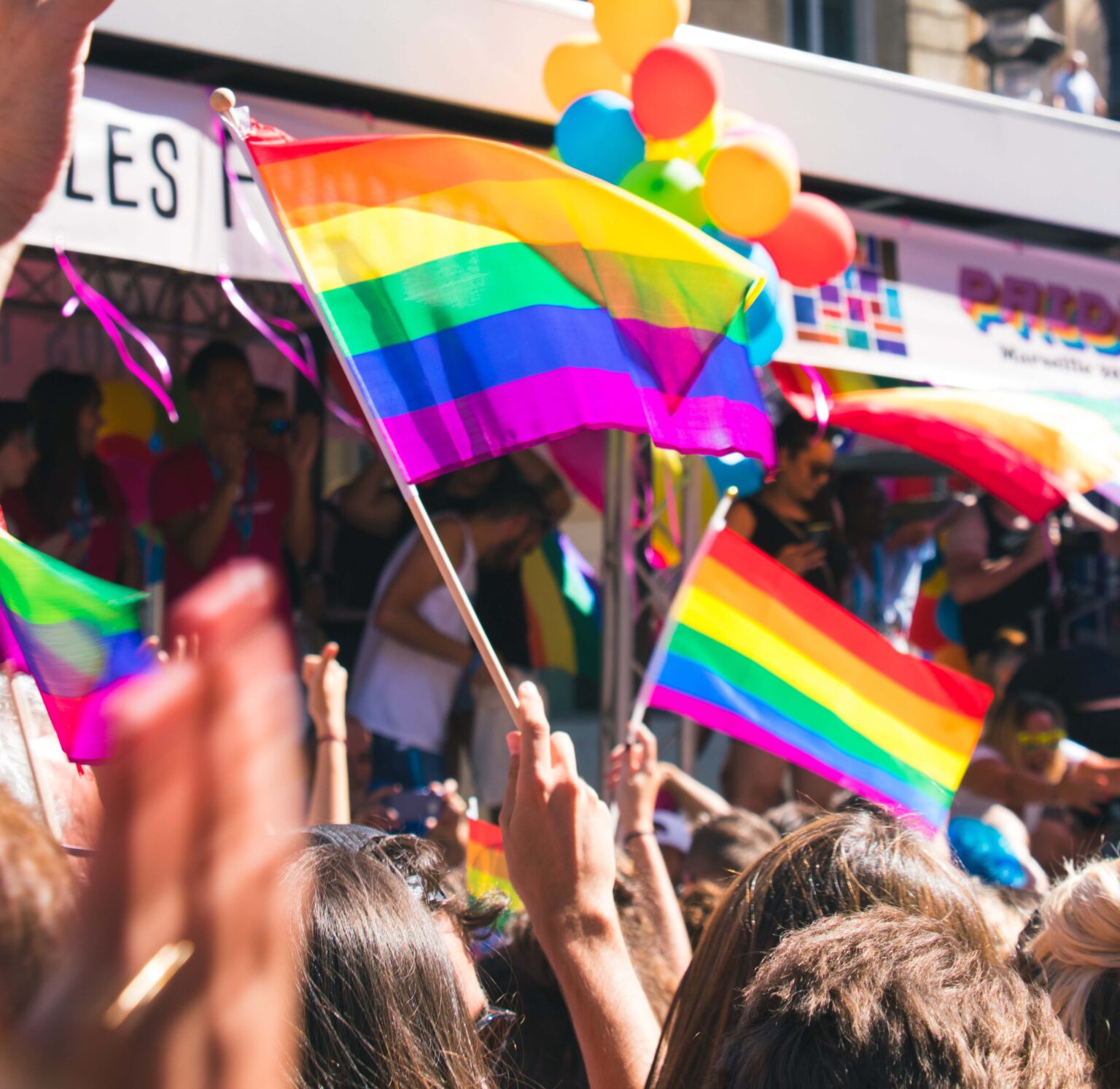
Get involved with ILGA-Europe’s plans for Pride season!
Join in with our PrideWatch social media campaign this summer.
Freedom of assembly is vital – for all of us
In many towns and cities, Pride marches take place every summer, without disruption. However, the overall picture in Europe, both inside and outside the EU’s borders, is quite complex. The freedom of LGBTI activists to organise, gather and celebrate publicly is limited in some European countries.
Pride marches have always been a visible symbol of fundamental human rights and an indicator of how well democracy is functioning.
So, that is why ILGA-Europe will be keeping a close eye on how Prides are operating in 2018.
We will be talking to Pride organisers, participating in marches and reporting back on what we see and hear – sharing it all with you as part of the PrideWatch campaign.
Colleagues from our staff team or board members will be representing ILGA-Europe at lots of Pride events this summer. We’ll confirm soon where we will be attending, but 2017’s list looked like this:
- Sofia – 10 June
- Skopje – 23/26 June
- Istanbul – 25 June
- Madrid (World Pride) – 1 July
- Budapest – 8 July
- Tallinn (Baltic Pride) – 8 July
- Belgrade – 15-17 September (march will take place on 17 September)
- Podgorica – 23 September
How can you get involved in PrideWatch?
- Support your local Pride events.
- If you can’t attend a Pride, why not send messages of support and solidarity to your fellow LGBTI activists and allies?
- Follow what’s happening on the ground with the hashtag #PrideWatch
- Tell us what Pride means to you, by joining the #PrideWatch conversation on Facebook, Twitter and Instagram.
MILICA DORDEVIC and others v. Serbia

Ban on Belgrade Pride marches
(Application nos. 5591/10 17802/12 23138/13 25474/14), 17 November 2014
Find Court’s communication here.
- This group of cases relate to the banning of the 2009, 2011, 2012 and 2013 Belgrade Pride marches, because of the possible danger of violent counterdemonstrations. The applicants complained of State’s failure to protect their freedom of assembly due to discriminatory intent on the part of the state authorities based on the actual or perceived sexual orientation of the applicants and potential participants in the Parade.
- ILGA-Europe together with the International Commission of Jurists submitted the following:
- States should be afforded a narrow discretion in relation to the means used or measures to be taken in preventing violence or disorder, particularly where the threat of violence or intimidation comes primarily from counter-demonstrators; can reasonably be anticipated; and is directed at groups most at risk.
- States must put in place an adequate legislative and administrative framework to guarantee and facilitate the right to freedom of assembly.
Genderdoc-M v Moldova
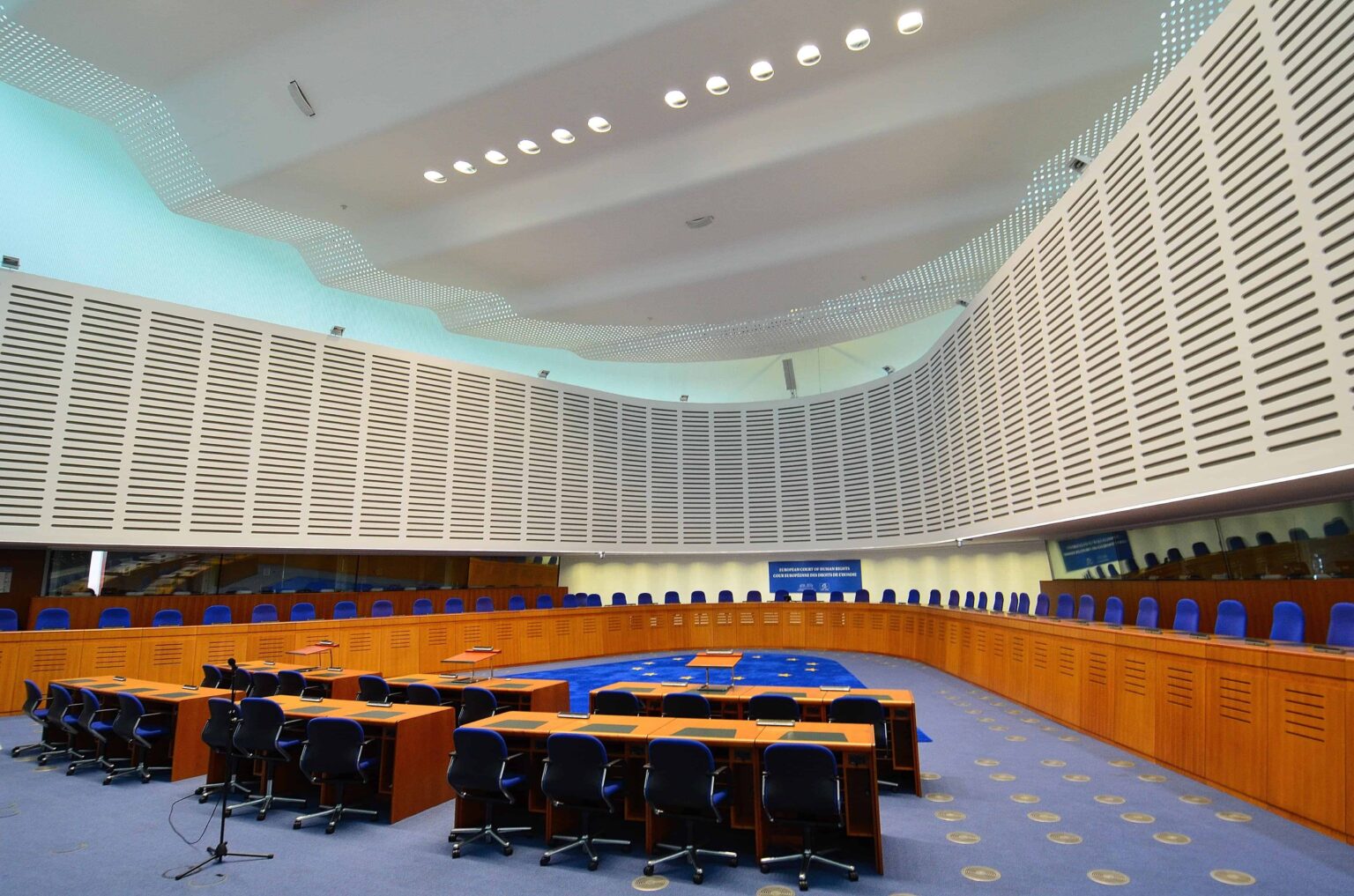
Ban on demonstration / Freedom of assembly of LGBT associations.
(Application no. 9106/06), June 2010
Find Court’s judgement here. (Violation of Article 14 in conjunction with Article 11 + award of damages)
- The applicant association – whose aim is to provide information and to assist the LGBT community in Moldova – complained that the ban imposed on it on holding a demonstration constituted a violation of its right to peaceful assembly. The Government alleged that the refusal was based on “public order” and “public morality.
- ILGA-Europe together with the International Commission of Jurists submitted the following:
- Public morality and public disorder are misused to justify interferences with the rights of LGBT individuals. The requirements of democratic societies are such that public morality and related prevention of disorder grounds must be narrowly construed and applied.
- The Court has emphasized the importance of freedom of association for minorities, which include people of diverse sexual orientations and gender identities.
- The European Court of Human Rights delivered its judgement on 12 June 2012.
- The Court referred to the interveners’ submission that the protection of morals is not and can never be an objective and reasonable justification under Article 14 of the Convention. It reiterated that sexual orientation is a concept covered by Article 14. It considered that the reason for the ban imposed on the event proposed by the applicant was the authorities’ disapproval of demonstrations which they considered to promote homosexuality. When limiting the right of assembly, national authorities should offer clear reasons for so doing. However each authority which dealt with the applicant association’s request to hold a demonstration rejected it for a different reason. In view of the above, the Court held that there had been a violation of Article 14 in conjunction with Article 11 of the Convention.
Prides against Prejudice. A toolkit for pride organising in a hostile environment
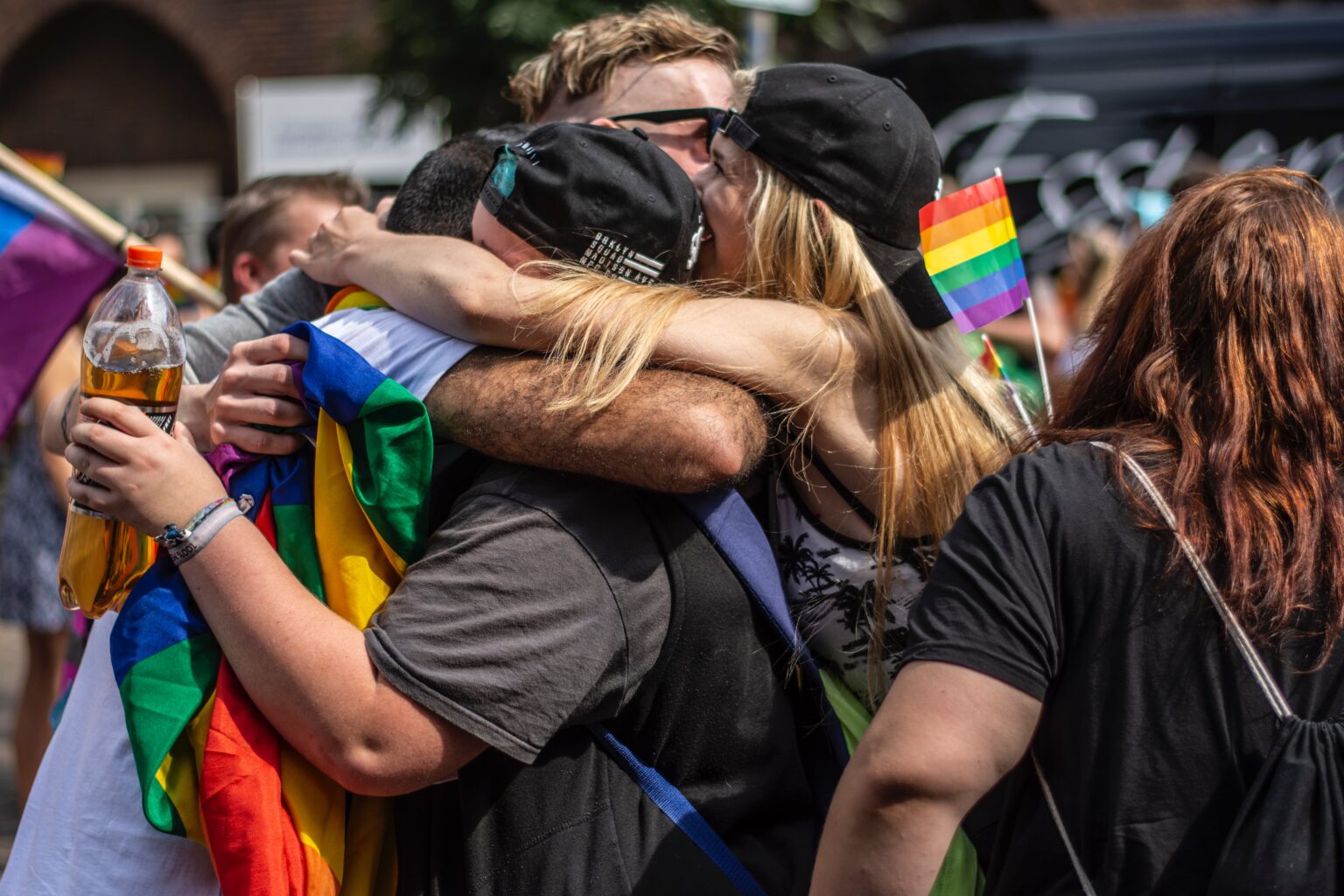
This toolkit is intended to provide ideas and information resources for those wanting to organise Pride events in a hostile environment. The need for it has been made clear by the intense hostility faced by many Pride organisers in Central and Eastern Europe.
In drawing heavily on their experiences and successes, and matching this input with information on support available from the European institutions and the LGBT community internationally, it aims to underpin the consolidation of progress made so far, and provide the initial know-how for those wishing to arrange events in countries and towns where no Pride events have yet been held.
The struggle to achieve freedom of assembly and expression for LGBT people across Central and Eastern Europe presents enormous challenges, excitement and exhilaration. Hatred and the ever present threat of violence have to be met with great courage and commitment. The photographs included in the toolkit (and provided so willingly by the many photographers) capture the spirit of these important events, honour those who have taken part in them, and will, we hope, inspire many more to take up the cause.Handbook on Observations of Pride Marches

This Handbook, published in June 2006, has been designed for people and organisations who are thinking of monitoring human rights abuses occurring during Pride marches. The human rights monitoring technique described here is the observation of marches by independent observers.
The Handbook looks at different aspects of observing Pride marches. It explains briefly the principles of human rights monitoring. It lists relevant human rights instruments which can be invoked when a Pride march is banned or violent. Then it gives some practical advice and tools on human rights monitoring through observation of Pride marches. Once the factual information is collected it is important to gather the information in a report and to send it to the relevant human rights organisation. Information is given on organisations that monitor the implementation of human rights standards and how to approach them. Finally it looks into the possibility of taking cases before courts at national and international level and the challenges attached to this approach.
This Handbook is available in English, Russian and Croatian. - Miroslawa Makuchowska, Deputy Director at Campaign Against Homophobia, Poland:
loading... - Minister of Internal Affairs and Administration Mariusz Kami?ski, mariusz.kaminski@sejm.pl,